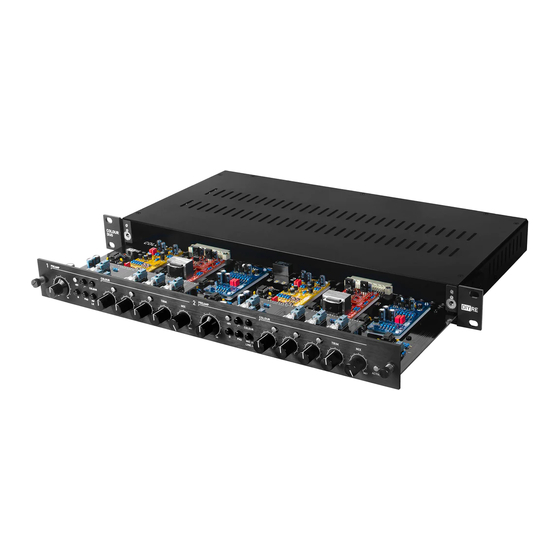
Table of Contents
Advertisement
Quick Links
Advertisement
Table of Contents

Summary of Contents for DIYRE COLOUR DUO
- Page 1 Ø COLOUR DUO 2-CHANNEL COLOUR CHANNEL STRIP Operation Manual...
-
Page 3: Power Input
Colour slots with independent controls, a makeup gain/trim control, and a wet/dry mix knob. Colours can be swapped via the Duo’s unique drawer feature without having to disconnect or power down the unit. If you purchased your Colour Duo as a DIY kit, please visit the online assembly guide: diy.re/duo-manual... -
Page 4: Front Panel Description
Front Panel Description GAIN (not labeled): Sets the mic preamp gain, between +20 and +66dB : Engages phantom power : Engages the 80Hz high-pass filter COLOUR : Engages the Colour section. When this switch is out the entire Colour section, including the controls TRIM , is bypassed. -
Page 5: Rear Panel Description
Using The Drawer The Colour Duo is the first Palette to allow for swapping Colours without using any tools or powering down the unit. To remove the drawer, simply loosen the two thumb screws on the front panel and pull the drawer toward you. -
Page 6: Use Cases
Use Cases Because of its versatile array of inputs and outputs, there are many ways to use the Colour Duo. This section illustrates three of them. Two-Channel Mic Preamp Besides being a Colour processor, the Duo is also a pair of no-compromise microphone preamps. With the Colour section bypassed, you can use them as a pair of transparent, low-noise preamps. -
Page 7: Troubleshooting
0dBFS to be as high as +24dBu. This means that if you are sending an average level of -6dBFS from your DAW, the Colour Duo is seeing a whopping +18dBu at the input. This level will create significant distortion in most Colour modules, and does not leave much room to turn the Colour knobs without clipping. -
Page 8: Block Diagram
Block Diagram Audio enters the Duo through either the . The can amplify the mic signal MIC INPUT LINE INPUT MIC INPUT up to 60dB, while the LINE INPUT has a fixed attenuation of -6dB. The MIC/LINE switch selects which input is sent to the rest of the unit. -
Page 9: Specifications
Specifications Line Input Impedance: 24kΩ Max Input Level: 27.5dBu Mic Preamp Input Impedance: 3.6kΩ with pad out, 7.2kΩ with pad in Gain: 20-66dB HPF: 80Hz, 6dB/octave Pad Attenuation: 20dB EIN (Equivalent Input Noise): -130dBV Line Output Output Impedance: 50Ω Max Output Level: +22dBu General Colour Drive Control Range: -6 to +12dB Trim Control Range: -14 to +10dB (unity at center) -
Page 10: Replacement Parts
Replacement Parts Below is a list of off-the-shelf components (other than custom parts) should you need a replacement down the road. For parts listed ‘DIYRE’ please contact us for replacements at diy.re/contact REFERENCE DESIGNATOR VALUE MAN. PART NUMBER SOURCE Diode bridge... -
Page 11: Recall Sheet
Recall Sheet Print your own at diy.re/recall Date: Track: Ch 1. Colour 1: Ch 2. Colour 1: Artist: Instrument (Ch. 1): Ch 1. Colour 2: Ch 2. Colour 2: Project: Instrument (Ch. 2): Ch 1. Colour 3: Ch 2. Colour 3: Date: Track: Ch 1. - Page 12 As with any electronic device, operating the Colour Duo safely requires some common sense and respect for the dangers of electrical power. Treat your Colour Duo like a hair dryer. Don’t turn it on when it’s wet, only clean it with a dry cloth, and if you spill a liquid on it unplug it immediately and don’t turn it back on until it’s been repaired by a tech.
Need help?
Do you have a question about the COLOUR DUO and is the answer not in the manual?
Questions and answers